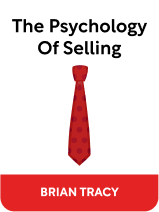

This article is an excerpt from the Shortform book guide to "The Psychology Of Selling" by Brian Tracy. Shortform has the world's best summaries and analyses of books you should be reading.
Like this article? Sign up for a free trial here .
Are you struggling to get sales? What can you do to increase your sales success rate?
To improve your sales success rate so that you end up in the top 20 percent of salespeople—or even the top 5 or 10 percent—you must consciously approach your job with a desire to improve. Fortunately, you can greatly improve your performance by following some guidelines that have helped many others improve their sales performance: the best way to succeed in sales is to do what successful salespeople do.
Here are 10 common guidelines to achieving sales success.
Guideline 1: Aim for Excellence
In order to succeed in sales, you must make the decision to succeed. Oddly, the majority of salespeople spend their entire careers just getting by in sales and never make a conscious commitment to excellence. Their inability to commit means they remain mediocre. In contrast, the people who do make this kind of conscious commitment are, every time, the ones who find great success.
Excellence is tied to happiness. On one hand, happiness leads to excellence: If you enjoy what you do, you’ll put your heart into it, which will lead you to become good at it.
On the other hand, excellence leads to happiness; when you’re successful, you’re happier and more satisfied with your life and career. The first step toward becoming competent in any endeavor is simply deciding to be so.
Guideline 2: Set Goals
As we’ve discussed, studies show that the people who have solid quantifiable goals in life and in work are the people who become the most successful. This is because their goals give them a road map, and without a map, it’s less likely you’ll end up somewhere deliberate.
We discussed setting goals earlier in more detail, so here we’ll just wrap the techniques you can use in a seven-step formula that can help you be more intentional:
- Decide exactly what you want: Be specific—for example, define how much you want to increase your income by.
- Write your goal down: This makes it feel real.
- Set a deadline: This gets your subconscious mind to work on it.
- Make a list of everything you can do to achieve your goal: Keep an ongoing list of specific activities and ideas.
- Organize this list: Figure out which of these actions are most important and then figure out the sequence in which they need to be completed.
- Take action: Successful people are action-oriented. Don’t delay getting started on your goal.
- Work toward your goal daily: Develop the discipline to make your goal a part of your regular life. Think about your major goal every morning and every night. Discuss it with your friends and family—letting other people in on it will encourage you to commit to it more strongly.
Guideline 3: Be Persistent
A successful person is persistent and determined in pursuing her goals. Develop an attitude of complete commitment. Deciding to not accept failure engages your whole mind—conscious and subconscious—and taps into your willpower to succeed.
Focus on being resilient. People who bounce back quickly from setbacks—such as rejections—are ultimately successful.
Guideline 4: Become a Lifelong Learner
One difference between successful people and the rest is that successful people continue to learn throughout their lives. However, most adults do not do this; once they have left school, most people rely on the knowledge they’ve accumulated and the skills they’ve developed up to that point—which are typically basic. Unfortunately, a person can’t advance much if she’s relying on outdated knowledge and skills.
Your mind is your most valuable asset. Invest in it by seeking out learning opportunities to help it grow. Read books, attend seminars, take courses, and listen to audio programs. You will expose yourself to ideas that will help you and opportunities that will move your career forward.
Guideline 5: Manage Your Time Well
Successful people are efficient with their time, spending the majority of it on those tasks and activities that will bring them the most value. Your time is a finite resource and it is another one of your most valuable assets (along with your mind). Managing your time well is crucial to finding success.
Follow these guidelines to see an instant improvement in your time management skills:
- Make a list: Every night, make a list of the things you want to accomplish the following day. This should include both work and personal items. Note your fixed appointments that you’ve already committed to first, then add other activities that you would like to get to.
- Prioritize the list: Determine which items on your list are the most important and the most likely to bring you benefits. Figure out the most important item by asking yourself, “If I could only do one thing tomorrow on this list before I headed out of town, which would it be?” Then ask the question again to figure out the second most important item on your list, and so on. Also ask, “Which of these items will have the biggest positive effect on my work?” Running through questions like these will help you determine which tasks should be addressed first.
- Focus: Once you’ve determined the most important item to address, focus on it fully until it is completed.
Guideline 6: Seek Out Successful People
As we’ve stated earlier, successful people learn from other successful people. Identify the people in your field whom you admire and want to emulate. Then, get to know them. Study what they do. Associate with them when possible. Ask them questions. Ask them for advice not only on your career directly (for example, specific opportunities you might face or companies you might work for) but also on peripheral elements such as books you can read or classes you can take to improve your skills at selling.
Importantly, if one of these successful people gives you a piece of advice, take it. If she recommends a book, read it. Then, the next time you interact with her, you’ll have a point of connection, and she will likely want to help you out further.
Take note of these peoples’ habits, attitudes, clothing, and philosophies, so that you can adopt them into your own routines. When you’re behaving and presenting yourself in the same way as these successful people, you’ll find your own success increasing.
Guideline 7: Maintain Your Integrity
To be a successful salesperson, maintain a reputation as trustworthy. If customers don’t trust you, they won’t buy from you. If other salespeople don’t trust you, they won’t work with you, and your employment opportunities will be limited.
Fortunately, maintaining a reputation as trustworthy is easy: Simply be trustworthy. Don’t lie, cheat, or steal. Deal with people honestly and fairly. Don’t try to trick a customer into a sale.
Guideline 8: Unlock Your Creativity
We discussed how you can access your creativity in greater detail earlier. We’ll review it quickly here because it is an essential part of realizing your potential as a salesperson.
Although most people outside of the arts tend not to see themselves as creative, you must recognize your inner creativity so you can access it. One way to do so is to use positive affirmations to engage your subconscious (“I’m a genius!”).
Then, find and develop your special talent. Everyone has a natural, special talent that is uniquely theirs. A special talent is something you:
- Enjoy doing
- Love to learn about
- Love to talk about
- Have a natural knack for, so that it’s relatively easy for you to do.
Your special skill may be selling. Recognize it as a special skill. Tell yourself this is your skill, and believe that you are capable of becoming a master of it. Believing in your natural skills will help you access creative ways to improve them.
Guideline 9: Treat Others Well
Successful salespeople live by the Golden Rule: Treat others as you want them to treat you. This coordinates with Guideline 7: Maintain Your Integrity, because when you live by the Golden Rule, you will easily maintain a reputation of integrity.
Just as you’d want a salesperson to be honest and straightforward with you, so should you be honest and straightforward with your customers. Just as you’d want a salesperson to follow through on promises, so should you keep your promises.
When you treat others decently, you reap the benefits of their goodwill. A customer who feels well-treated will view you, your product, and your company more positively. She will then be more open to buying from you, and your sales numbers will increase.
Guideline 10: Work Hard
In the end, the secret to success doesn’t lie in being smarter, more attractive, or more capable than anyone else. Success comes to those who work hard for it—that’s the secret. A little more effort than the next person, consistently, every day, over the course of years, will yield dramatic results. All it takes is starting a little earlier, staying a little later, making a few more calls.
If you intend to end up as a top salesperson, you must give your career 100 percent effort. This is especially true in the early stages of your career, when you’re getting your success off the ground. Once you’ve reached a level of success you’re happy with, you’ll be able to maintain a consistent income while making more time for friends and family. But to get to that point, you’ll need to devote full effort and work just a bit harder than your colleagues. Fortunately, if you work smart and hard, your success is virtually guaranteed.

———End of Preview———
Like what you just read? Read the rest of the world's best book summary and analysis of Brian Tracy's "The Psychology Of Selling" at Shortform .
Here's what you'll find in our full The Psychology Of Selling summary :
- How to dramatically increase your sales
- How to know what your customers are thinking
- Brian Tracy's 10 guidelines for success






